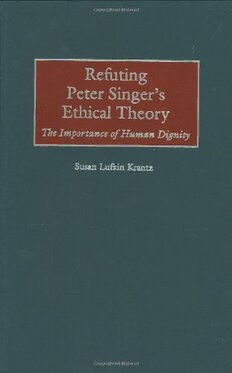
Refuting Peter Singer's ethical theory: the importance of human dignity PDF
02002·0.254 MB·English
Most books are stored in the elastic cloud where traffic is expensive. For this reason, we have a limit on daily download.
Preview Refuting Peter Singer's ethical theory: the importance of human dignity
Description:
Krantz provides a defense of traditional, human-centered ethics against Peter Singer's ethical theory. Singer favors a Copernican revolution in ethics because he thinks our traditional ethics has collapsed under pressure from medical technology and from advances in the biological understanding of our fellow animals. For nearly thirty years he has argued that the boundaries of the human lifespan and of the human species are so unclear that we must abandon our views that human beings have a special dignity and that the taking of innocent human life is always wrong.Against this Krantz argues that in today's world, human life has been cheapened and the values of the marketplace have begun to govern medical care and organ donation, birth and death. In fact, this is just a foretaste of the world to come if Singer's ethical theory succeeds in replacing traditional human-centered ethics. What is required is, not the abandonment of human dignity and of the sanctity of human life, but rather a renewed understanding of how principles based on these ideas can be applied in the twenty-first century. Scholars, students, and general readers involved with ethical and contemporary philosophy issues will find this book interesting.
See more
The list of books you might like
Most books are stored in the elastic cloud where traffic is expensive. For this reason, we have a limit on daily download.
